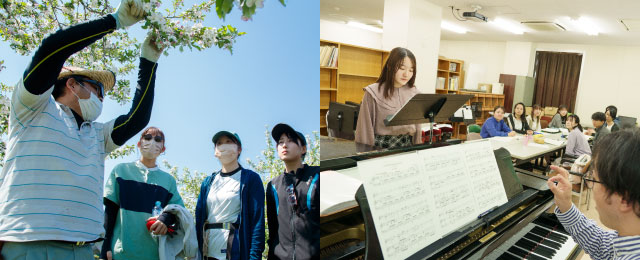







Home > Faculties and Schools > Diploma and Curriculum Policies (Graduate) > Diploma and Curriculum Policies of the Graduate School of Medical Science
The Medicine Major confers a degree on students who have achieved the requirements below and completed the Doctoral Program or those who were in the Doctoral Program for a prescribed period of time, submitted a dissertation after obtaining the necessary number of credits and successfully passed the dissertation screening and final examination.
The degree holder is equipped with cutting-edge specialty knowledge and skills as well as a rich knowledge in general clinical medicine and can plan and execute own research from a wide perspective. The holder also possesses the overall ability to present own research results at academic meetings and in academic papers.
The degree holder has cutting-edge specialty knowledge as well as a wide basic knowledge of clinical medicine and can plan and execute own research from a wide perspective. The holder also possesses the overall ability to present own research results at academic meetings and in academic papers.
The Doctoral Program conducts highly specialized research guidance and education through the specialized medical curriculum and specialized curriculum for cancer specialist training. It offers a common curriculum consisting of lectures and practices to develop people who can play central roles in basic medicine, clinical medicine and social medicine and have a wide knowledge and skills in areas other than their specialties. The course for cancer specialist training provides lectures and practices that allow students to achieve specialist qualifications. The genome cohort research course offers more practical, panoramic, systematic and advanced genome cohort education to students who wish to pursue this area of study.
The Environmental Life Science Major confers a master's degree on students who have completed the Master's Program and satisfy the requirements below:
The degree holder must be equipped with a basic knowledge of medical science in general other than own specialty field, research skills and the abilities to tackle a new research field by understanding academic papers and presentations at academic meetings and present and discuss own research results at academic meetings.
A doctoral degree is conferred on students who satisfy the requirements below and have completed the Doctoral Program or those who were in the Doctoral Program for a prescribed period of time, submitted a dissertation after obtaining the necessary number of credits and successfully passed the dissertation screening and final examination.
The degree holder must have acquired deep cutting-edge knowledge and the research capability necessary to further medical research and a wide knowledge of medical science in general, is able to plan and execute research and possesses the comprehensive ability to present research results in academic papers and at academic meetings.
Researchers of various fields cooperate with each other in carrying out community-based research and solve problems. For fostering people who further promote the research on the basis of research results, the program conducts education with the following four points in mind:
A master's degree is granted to students who have completed the Master's Program and:
A doctoral degree is awarded to students who have completed the Doctorral Program and:
The Master's Program provides nursing education to foster people who can logically and systematically explain nursing phenomena and possess the basic ability to promote nursing study. In order to nurture researchers and advanced professionals, the curriculum is compiled as follows:
The Doctoral Program is designed to develop independent advanced nursing professionals who can ensure the safety and security of nursing and care service users, contribute to life with dignity and the development of health support and are inclined to research with the integrated capability to develop nursing and care theories, skills, systems and human resources. To this end, the curriculum is compiled as follows: